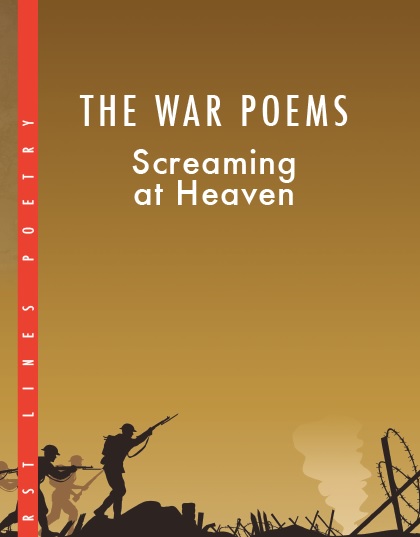Is there such a thing as a “born poet”? I think of Robbie Burns or Al Purdy. If so, Keith Inman is one of them. A quiet man who watches and reflects, the “words stay(ing) under his tongue,” as one of his poems puts it. Under the tongue, that is, until they find their way to the page. He speaks for those who have never read poetry and would be unable to fathom why anyone would want to write it.
War Poems: Screaming at Heaven is the best book of any kind I have read for years. It is brilliant.
The “frame” Inman uses is incomparable. An italicized list of current events precedes each poem: political antics, literary publications, pop culture, sophisticated culture. These appear as they might in a newspaper. Life’s big picture.
The poems that follow are the small picture, the tiny miniatures that make up the minutes and seconds of personal lives. Juxtaposed to the big picture of world events they have a startling – sometimes shocking – intimacy. That keen intimacy that both complements and resists the general truths of the big picture.
In two broad sections, “Wars of Independence: 1812-1887” and “A Republic Monarchy,” (both ironic) Inman shows Canada and Canadians for what they have been and are. His specificity results in a universality deeper and more complex that those of the news event that frame them. Like carnival mirrors they reflect and distort the realities of human anxiety and foibles.
Inman quietly refrains from moralizing. He refuses to push or even nudge the reader in any particular emotional direction. “Here it is,” he seems to say. “Here she is. Here they are.” He excels in the “character poem,” as he calls it. Take Art in “Always, There Are Flowers.” He’s a war vet with a “poppy patch of skin/ that used to be his ear.”
Art is drinking away his pain “chunkering” to himself
under a fake-beamed
ceiling of a reproduced English Manor
with dead rabbits on fine china, horns
of fruit, and bouquets of flowers covering
the walls.
Or, take immigrant construction workers “Dargmar and Jorge”:
they chip, sledge
hammers stuttering:
two beers and a whiskey,
two beers and a whiskey
Or, take “Susie” of the studs, earrings and chains, who gets the unfeeling Mr. Reilly to clear her chimney of a bird’s nest, chicks and all.
It’s all about death. About danger. About the Nazi in all of us. About whether we survive – or not. Inman’s characters and their stories are as ordinary as front steps show so much in so few words.
Typically, he uses understatement, subtle internal and slant rhymes, various stanza forms shaped to his subjects, and words that reverberate in many directions at once to suggest and reveal. Like Art’s “poppy patch of skin” where his ear once was, which recalls the poppies of Flanders’ Field. His rhythms – especially those of colloquial speech – are certain and true. There is a rightness to each stanza, each line, each word.
A “born poet” must know that the greatest truths are those told in the most insignificant moments. In “small lives.”
This book is filled with such moments and lives. Every Canadian should read it.
To receive similar content, “Like” us on Facebook @ https://www.facebook.com/niagarabuzz.ca










